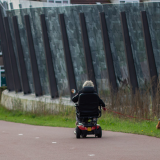
Viešosios paslaugos
Viešosios paslaugos tokiose srityse, kaip sveikatos priežiūra, švietimas, socialinė rūpyba ir transportas, yra būtinos norint užtikrinti gerą socialinę apsaugą, socialinę sanglaudą ir socialinę įtrauktį. Tačiau jų sėkmę kintančioje visuomeninėje ir demografinėje aplinkoje lemia paslaugų kokybė ir galimybė jomis naudotis.
Politikos formuotojams keliamas uždavinys užtikrinti, kad sveikatos priežiūros ir socialinės paslaugos būtų kuriamos ir teikiamos atsižvelgiant į įvairius piliečių poreikius. Tas iššūkis padidėjo dėl didelių finansinių apribojimų pastaraisiais metais, dėl didėjančios paklausos ir iš dalies dėl pabėgėlių antplūdžio į Europą. Taip pat kyla ir naujų klausimų, susijusių ne tik su paslaugų prieinamumu ir kokybe. Be kita ko, tai rizika, kad, pradėjus naudotis naujais skaitmeniniais paslaugų teikimo kanalais, gali būti izoliuotos jau ir taip palankių sąlygų neturinčios bendruomenės, taip pat gali būti sunku užtikrinti teisę gauti paslaugas ir paslaugų kokybės standartus.
2013 m. Komisijos paskelbtame Socialinių investicijų dokumentų rinkinyje valstybės narės raginamos daugiau akcentuoti kokybiškas viešąsias paslaugas. Be to, 2015 m. patvirtintoje Komisijos bendrosios skaitmeninės rinkos strategijoje akcentuojama, kad viešųjų paslaugų modernizavimas yra būdas skatinti konkurencingumą. Norint didinti išlaidų veiksmingumą ir paslaugų kokybę, būtina diegti naujas technologijas, viešąsias paslaugas internetu ir užtikrinti tarpvalstybinį sąveikumą. 2017 m. balandžio mėn. Komisija pristatė Europos socialinių teisių ramsčio dokumentų rinkinį. Tarp pagrindinių jame numatytų principų – teisė į kokybišką švietimą, ikimokyklinį ugdymą ir priežiūrą, sveikatos apsaugą, socialinį būstą ir kitas svarbiausias paslaugas.
- Europos Komisija Socialinių investicijų dokumentų rinkinys
- Europos Komisija Bendroji skaitmeninė rinka
- Europos Komisija Europos socialinių teisių ramstis



























